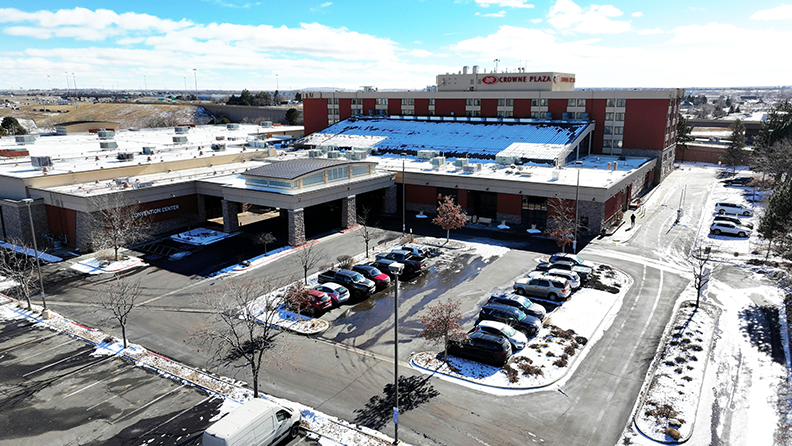Aurora To Open New Campus to Support Unhoused Residents

Aurora To Open New Campus to Support Unhoused Residents

Summary
On a warm Wednesday afternoon (November 12), the sprawling Aurora Regional Navigation Campus (ARNC), located in the northeast corner of I-to and Chambers Road in Aurora, welcomed the community to an informational open house, offering neighbors, partners, and supporters the opportunity to tour a sprawling facility designed to help unhoused residents rebuild their lives.
Wednesday’s guests explored the sleeping areas, classrooms, kitchen, and dining areas, as well as the massive Day Center (which was the former hotel’s lobby and gathering area), which can accommodate up to 300 individuals and features tables and chairs, and comfortable seating areas for conversation and relaxation. A piano adds a welcoming touch, hinting at the small joys residents might share as they settle into the space.
The campus’s housing quarters are divided into three tiers, giving incoming residents choice and support at every stage. Tier 1 offers a low-barrier emergency shelter, open nightly with basic rules. Tier 2 provides semi-private accommodations where residents meet with case managers to set personal goals. Tier 3 is transitional housing for residents transitioning toward independence, with the goal of securing employment and assuming increased responsibilities. Between the first two tiers, the campus offers 170 beds for men and 130 for women, ensuring accessibility, storage, and other amenities for those seeking safety, dignity, and a clear path forward.
Programs at the campus are practical and hands-on. Residents can learn computer skills, cooking, and other life skills, alongside mental health support and recovery programs. Participation is voluntary, and residents in tier three are encouraged to actively contribute to their own progress. Advanced Pathways (AP) oversees the facility and its programs on behalf of the City of Aurora, providing guidance, mentorship, and long-term support to participants in the city’s unhoused program.
Leslie Summey, an Arapahoe County Commissioner serving District 4, opened the session with a message of gratitude and appreciation for the community. “They have a chance to rebuild their lives, and then our entire community grows stronger, and that is what makes my heart sing,” she said, highlighting how collaboration strengthens both individuals and the community.
Mayor Mike Coffman followed, explaining the three-tier housing approach and the campus’s vision. He noted how residents can access mental health services, recovery programs, and job training at each stage. Coffman emphasized that the first tier is intentionally basic to encourage progression, while residents in the third tier gain more independence and responsibilities, contributing to their own recovery. He also emphasized the importance of public-private partnerships in transforming the campus into a model for Colorado and beyond.
Jim Goebelbecker, Executive Director of Advance Pathways (AP), shared the organization’s human-centered philosophy. “We want to see the humanity of someone who is looking to do something different—they have that potential. And if we extend love, we extend compassion,” he said. The ARNC is a public-private partnership supported by operational funders, including the Daniels Fund, Answers Foundation, and Dakota Fund. With 85% of AP staff having personal experience with homelessness or recovery, the campus is built on empathy. Goebelbecker emphasized that the facility is about reshaping lives, fostering independence, and helping people believe in their potential, not just providing housing.
Outgoing Aurora Councilman in Ward II, Steve Sundberg, concluded the official remarks from elected officials and organizational leaders with a message of hope, using a “seed time and harvest” metaphor from his grandfather’s farming background. Sundberg spoke of planting opportunities and nurturing growth, reflecting Aurora’s belief that people can heal and thrive when given the right support.
Visitors explored the Day Center’s striking art, including Mario Miguel’s mural. It features a sociable weaver bird—found only in Africa—outside its protective nest, near a rising phoenix symbolizing resilience and new beginnings. This imagery reflects the campus’s mission to support and empower residents. Miguel also spoke, sharing how the unique African bird inspired his work.
The self-guided tour provided visitors with a close look at classrooms, the kitchen and dining area, an exercise room, the Day Center, the sleeping quarters, and a room for pets. The spaces were open and welcoming, designed for both activity and comfort. The Day Center fosters connection, from quiet moments to casual conversation, helping residents feel at home as they work on skills, pursue recovery, or simply enjoy playing the piano.
The campus demonstrates a practical and empowering approach. Residents will choose their pace, move through the tiers when ready, and can access a wide range of programs—from computer and cooking classes to life skills, job training, and recovery support. Every aspect of the campus is designed to help residents regain independence, confidence, and hope.
It’s important to note that this open house was a community preview. The campus will begin welcoming unhoused residents on November 17, marking the start of a new chapter for those ready to engage with the programs and services offered.
The Aurora Regional Navigation Campus is not just a former hotel and convention center transformed into a center for the unhoused — but hopefully a place of opportunity, support, and second chances, as well as a showcase for what can happen when a city chooses to believe in its people. A place where hope is planted—and where, with care, it begins to rise.
DWN
